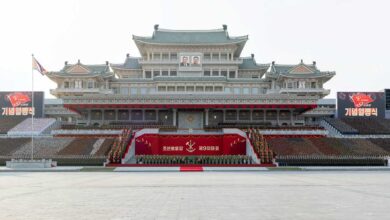On January 5, 2009, during his visit to the newly built Wonsan Youth Power Station, Kim Jong Il called in on a newly-wed couple. They had been working at the power station after being discharged from military service.
At the yard of the house he saw five fruit trees and praised them. Seeing the triple-glazed windows in the room, he advised that they should be glued up to keep out cold. In the kitchen he saw many glass bowls and pots, joking that he would let on to the citizens in Pyongyang, who were running short of pots, that there were spare ones in this house. And seeing the photograph they had taken for their wedding ceremony, he jested that he was envious of the many flowers and delicious foods on the table.
Then his eyes reached the balls of fermented soya beans hanging up on the wall of the other room. Thinking that the balls were apparently eyesores in their new house, the officials gave the couple a reproving look.
The husband blushed and his wife dropped her head in embarrassment.
But Kim Jong Il said with a broad smile:
“It is good to see the balls of fermented soya beans hanging on the wall. It is a sight unique in the countryside. This is worthy of a socialist fairyland. In Pyongyang they draw curtains on the walls of their flats. Balls of fermented soya beans are hanging up in this house, which is more pleasant to my eyes. They give out a good smell.”
Petting and soothing the balls, he said: Soya bean paste is efficacious in preventing thrombus and sclerosis of blood vessels in the heart. Mould is generally regarded as a cancer-causing substance, but soya bean paste reduces the risk of cancer. Besides, its ingredients are mostly good for human health. The German doctors, after taking a contrast photography of the coronary arteries of Korean cases, attributed their clean arteries to the Korean custom of eating soya bean paste. In Europe they tend to adopt this dietary habit of our people.
All listened attentively to his lecture on the specialty of the nation.
He resumed:
“A saying goes that a happy man does not really appreciate how happy he is. There are many who do not know how cultured and scientific the Korean nation’s long-standing custom of making soya bean paste is. Those balls on the wall are proof that the wife is very adept at making soya bean paste.”
The young woman was embarrassed.
Frankly speaking, her husband had a better knowledge of it and the balls were his brainchild.
During his inspection tours around the front line Kim Jong Il would encourage the army units to press ahead with soya bean farming. When they were in the army, the husband and his wife had already learned how to make soya bean paste.
Kim Jong Il posed for a photograph with the couple and wished them a happy future.
Noting that they could make soya bean sauce by adding salt, he said that if they made delicious sauce, he would drop by and bring some bottles of it for himself. Before leaving the house, he reiterated that he would come again for the sauce.

